Bombay Superstar
By memsaabIn 1973, the BBC documentary series Man Alive aired an episode about the then-reigning superstar of Hindi cinema, Rajesh Khanna, called “Bombay Superstar.” Thanks to my friend and fellow Rajesh fan Asli Jat (who also wrote a helpful synopsis of it for me) I managed to finally get a rare look at it: a copy of a VHS tape digitally converted several times, so quality is not optimal, but it’s easily interesting enough to make it worth seeing.
Reporter Jack Pizzey went to India and managed to interview the reclusive star, along with directors Hrishikesh Mukherjee and J. Om Prakash, actors Mumtaz and Shashi Kapoor, and others. Footage includes his surprise wedding to Dimple Kapadia, the Kashmir location shoot of Aap Ki Kasam and the film premiere of Daag. Besides being a profile of Rajesh, it’s also a fascinating look at the politics and power plays inside the industry, and the struggle it takes to stay at the top.
I’ve included some audio clips so that you can have the pleasure of hearing these legendary film personalities speak, along with some (very poor) screen shots of the program.
The program opens on the sets of Namak Haraam, where Hrishikesh Mukherjee is waiting for Rajesh to show up. Pizzey informs us that Rajesh has the “charisma of Rudolph Valentino, the arrogance of Napoleon, and he’s late.”
When Rajesh finally shows up, Mukherjee makes him wait in a game of one-upsmanship. Finally Rajesh makes the first conciliatory move, and goes to meet Mukherjee, who briefly scolds him before they begin shooting. Rajesh has said that his legendary lateness on set was never deliberate but due to his inability to get going in the morning. He also claims to have been generally more punctual than usual when working with Mukherjee, which somewhat negates that first statement. In any case, his habitual tardiness is generally considered a large contributor to his downfall.
His breakup with actress Anju Mahendroo is also briefly mentioned by Pizzey (who calls her his “latest mistress”—I can only imagine how that must have made her feel since she shared a serious long-term relationship with Rajesh).
Even the BBC has trouble getting Rajesh to show up for their scheduled interviews. When he is finally—on the fifth try—granted an audience at the actor’s home, Pizzey asks Rajesh what it’s like to be a star. I’m surprised by Rajesh’s English: it’s more British than Indian-accented. He’s also very soft-spoken.
He comes across as quiet and somewhat shy, but quite candid and sure of getting what he wants.
This interview is followed by footage of his baraat and wedding to Dimple Kapadia. It is interspersed with comments by a gossip columnist for “Star & Style” magazine named Devi. She has known Rajesh for a long time, since before he became famous. She says that he had called her to tell her of his impending nuptials, but she dismissed it as drunken rambling and told him to go to bed! Hilarious. She is quite a character (and we meet her again later).
Next stop is Kashmir, on location with Aap Ki Kasam. Pizzey sits and talks with Rajesh about his heroine-romancing style. Again, Rajesh seems quite shy and a little embarrassed, but demonstrates his characteristic eye-crinkling for Jack and the cameras.
There is extensive footage of the huge crowds that have gathered to watch the day’s filming, and Pizzey asks Rajesh and Mumtaz as they wait on the sidelines what they think of the mayhem. I love Mumtaz’s reaction.
Pizzey then talks about music’s place in Hindi cinema with the film’s director and producer J. Om Prakash, and watches Rajesh and Mumtaz filming the song “Suno Kaho.” He asks Mumtaz about lip-synching and playback singing.
Devi shows up to visit Rajesh and gather fodder for her column, and takes the piss out of him too:
She reminds me of Farah Khan, just a bit, with her caustic wit.
Song filming continues, and when J. Om Prakash is asked about the lack of a kiss to seal the musical romancing, he is quite droll:
Rajesh is shown doing the same step for the “Suno Kaho” picturization over and over and over again, after which he talks about the choreography, doing retakes and playback singing (referring also to whom I can only assume must be Kishore Kumar).
The BBC crew takes Mumtaz out in a Kashmiri boat to get her away from the crowds, and Pizzey talks to her about stardom, and about an article which Devi has written about Mumtaz on her return to Bombay, which casts aspersions on Mumtaz’s mother’s character. Mumtaz has decided to sue.
She talks a little about the pitfalls of stardom as well.
I love getting to see Mumtaz as Mumtaz (or at least as much as she’s willing to be “herself” in front of a stranger). She is just gorgeous, too.
Back in Bombay, it’s time for the annual Filmfare awards, and Rajesh is reportedly unhappy that he hasn’t won (he has won the Best Actor trophy the previous two years in a row).
I have to say that if I were an actor I’d be pretty upset about losing an acting award to Manoj Kumar too (for Be-Imaan). Rajesh’s fans aren’t happy either, as Filmfare editor Mr. Karanja explains to Pizzey.
A friend of Rajesh’s is throwing a party on the same night as the awards show and is busily inviting everyone who is anyone. Devi opines that in order to be considered a success, Rajesh’s party will need at least five big stars to show up. On the day of the awards, Rajesh himself is reported to have fallen ill, but no one is really buying it. The big question is: will he show up at the Filmfare show, at his party, at both or at neither? Nobody knows for sure except Rajesh and he’s not telling.
At the party, Devi says that only one big name has shown up (Dilip Kumar) although I’ve spotted another one whose name I consider big, anyway, and that’s beautiful Rakhee.
Rajesh and Dimple do eventually arrive, but general consensus gives the win on this one to Filmfare. The next morning Rajesh denies any ulterior motive behind the party, and then in the next breath claims to have been missed by the awards show attendees.
It’s an appropriate segue into a discussion of Rajesh’s recent failures (Devi says five flops in a row, Rajesh himself says four). He seems keenly aware of the repercussions.
His film Daag is releasing the next day, and his hopes are pinned on it. Pizzey talks to Dimple as she has her hair done for the premiere.
Shashi Kapoor (billed by Pizzey as Rajesh’s “main rival” with his own period of flops behind him) is interviewed on what makes a film successful.
He’s much more talkative than Rajesh!
Daag is taken to the rural villages (where it’s shown in a tent put up specially for the occasion, with loudspeakers providing the audio). Consensus there is that the film is good, but not worth repeated viewings: a hint that it may not be the hit that Rajesh needs so desperately.
The fascination of this documentary for me was that it’s very rare to see such footage of industry players from that era. There may have been too much time given to Devi, in that she seemed to have a bit of her own agenda; but she was very entertaining, and that’s what it’s all about. It’s evident that the BBC crew didn’t do a lot of research into Rajesh Khanna’s life or the Hindi film industry in general; the tone is occasionally patronizing and the questions pretty basic, but there’s gold in there anyway.
Rajesh himself was going through a lot at that point in his life (although I believe Daag went on to be a pretty good hit for him—in any case, I like it!). It’s fascinating to get a glimpse into what that level of fame and success brings. The last shot of the documentary shows him looking out the window at the crowd of adoring fans thronged in front of his house, before he returns to his lonely seat to contemplate his uncertain future. Pizzey’s voiceover says: “The Superstar may not be quite so super anymore.”
I wonder what he would have to say about the program today, with the perspective of time.
I hope this post has given some of the flavor of the entire thing. I also hope that maybe one day the BBC will release it on DVD! Hindi film history is rarely documented like this, and for that reason alone it’s a treasure.
http://memsaabstory.wordpress.com/2008/10/08/bombay-superstar/
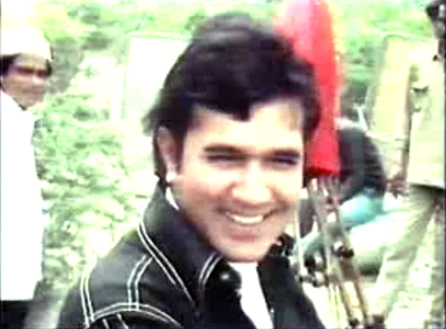



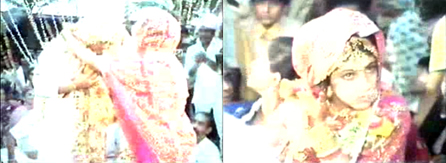

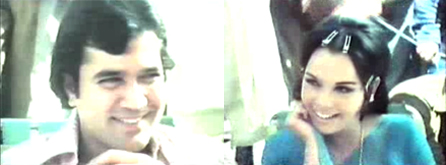
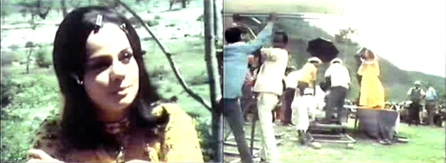
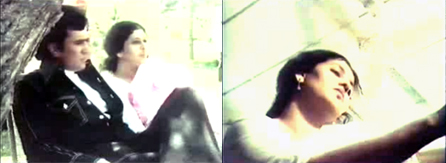



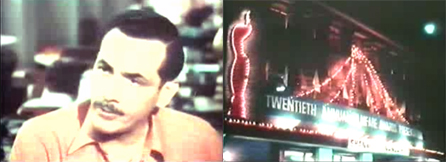
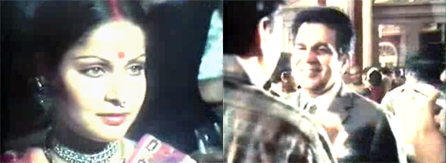
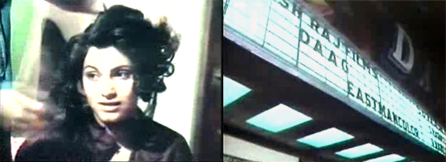
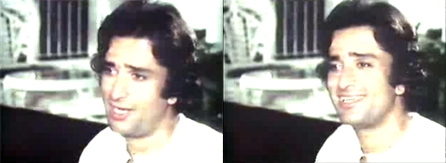
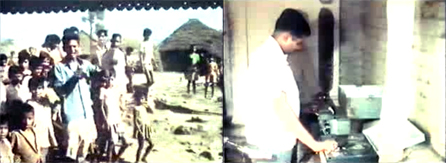
I would appreciate it if you would post a link to my content instead of copying it wholesale and pasting it here without attribution. It's plagiarism!
ReplyDeleteI appreciate that you want to create a blog in honor of the Superstar, but please use your own content.
wish we could lay our hands on the DVD
ReplyDeletememsaabstory - request to contribute
ReplyDeleteI sooooo want to see this! Seriously BBC needs to release this to the world, again!
ReplyDelete